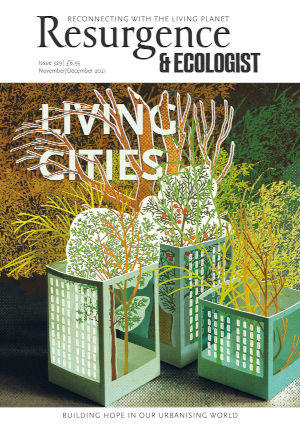In 1858, with a population of more than 2 million residents, London was in the grip of the Great Stink. The problem was the build-up of human waste overflowing the Thames. The city was suffering a heatwave and was gripped by cholera outbreaks.
The cheapest solution was settled upon. Joseph Bazalgette, a civil engineer, created a network of sewers running below London that washed the ‘night soil’ into the sea. The immediate issue was solved – but at the same time a new way of understanding cities, with their unprecedented demand for resources and production of waste, was lost.
“If the British people do not take the pains to secure the natural conditions of the permanent fertility of their land, if they allow these conditions as hitherto to be squandered, their fields will at no distant day cease to yield their returns of corn and meat,” warned the German chemist Justus Freiherr von Liebig at the time of the Great Stink. Liebig feared that disruption to the supply of food would lead to war and revolution. “Every man may picture to himself the state of things which will then gradually arise.”
This respected industrial scientist – the father of Marmite – should have been heeded. Liebig was the first chemist to fully understand the cycle of nutrients in Nature, resulting in the development of artificial fertilisers. He saw how plants ‘metabolised’ light and chemicals taken from the soil to stay alive. He explained the danger of the proposed London sewerage system. The crops grown in the fields across England drew nutrients out of the soil. These in turn enter our food system and our bodies, allowing us to live and reproduce. But then the nutrients enter our sewers and are washed into the sea.
“If all the elements of the fields, which, in their products in the shape of corn and meat, are carried into the cities and there consumed, nothing, or as good as nothing, returns to the fields,” Liebig explained in an 1859 letter to The Times. His warnings were ignored, his solutions to the sewage problem dismissed as prohibitively expensive.
There was, however, one attentive reader. Karl Marx, a threadbare German philosopher living in London, understood the gravity of the situation. Marx would later write that the “circuit of capital” could spin indefinitely, growing through a process of accumulation. But its linear production of commodities would at the same time exhaust the labourer – and also the soil. Marx described the metabolism of capitalism, which transforms the energy and nutrients of Nature into goods for sale. He interpreted Liebig as warning of a “rift” in the cycles of Nature that would lead to contradiction – to an existential crisis. But Marx the ecologist was also thoroughly ignored.
Liebig’s short-term solution to the nutrient problem – the use of artificial fertilisers – has its own consequences. Conventionally grown food consumed in London, even that grown elsewhere in England, depends on fossil-fuel-based fertilisers from Morocco, Algeria and Russia. “The fertilizer and nitrogen compound manufacturing industry occupies a market size of at least £1 billion,” according to a University of Oxford report. “Between 2017 and 2018, fertilizer costs increased by £116 million to £1,345 million because of increased global oil prices.”
The lessons from Liebig have now to some extent been heeded, and both human and animal waste is being returned to the land. But this only creates a new problem. The scale of modern factory farming and the size of our cities has meant that our fields and rivers are being swamped by waste – an overload of nutrients feeding algal blooms and killing almost everything else.
The problems of today are often yesterday’s solutions. We need cities to be run as circular economies where waste of all kinds is seen as the raw material for agriculture and production. This was Liebig’s original insight.
We need to develop symbiotic relationships between city and Nature where light is captured and nutrients and materials are continually created and recycled. Above all, we need to abandon the Petropolis, where cheap fossil fuels support endless global supply chains. And we need to create the Ecopolis – indeed the Ecomegacity – where fecund Nature is here and now, and not elsewhere and then nowhere.
To read the extended version of this article visit: theecologist.org/2021/oct/25/belly-beast








